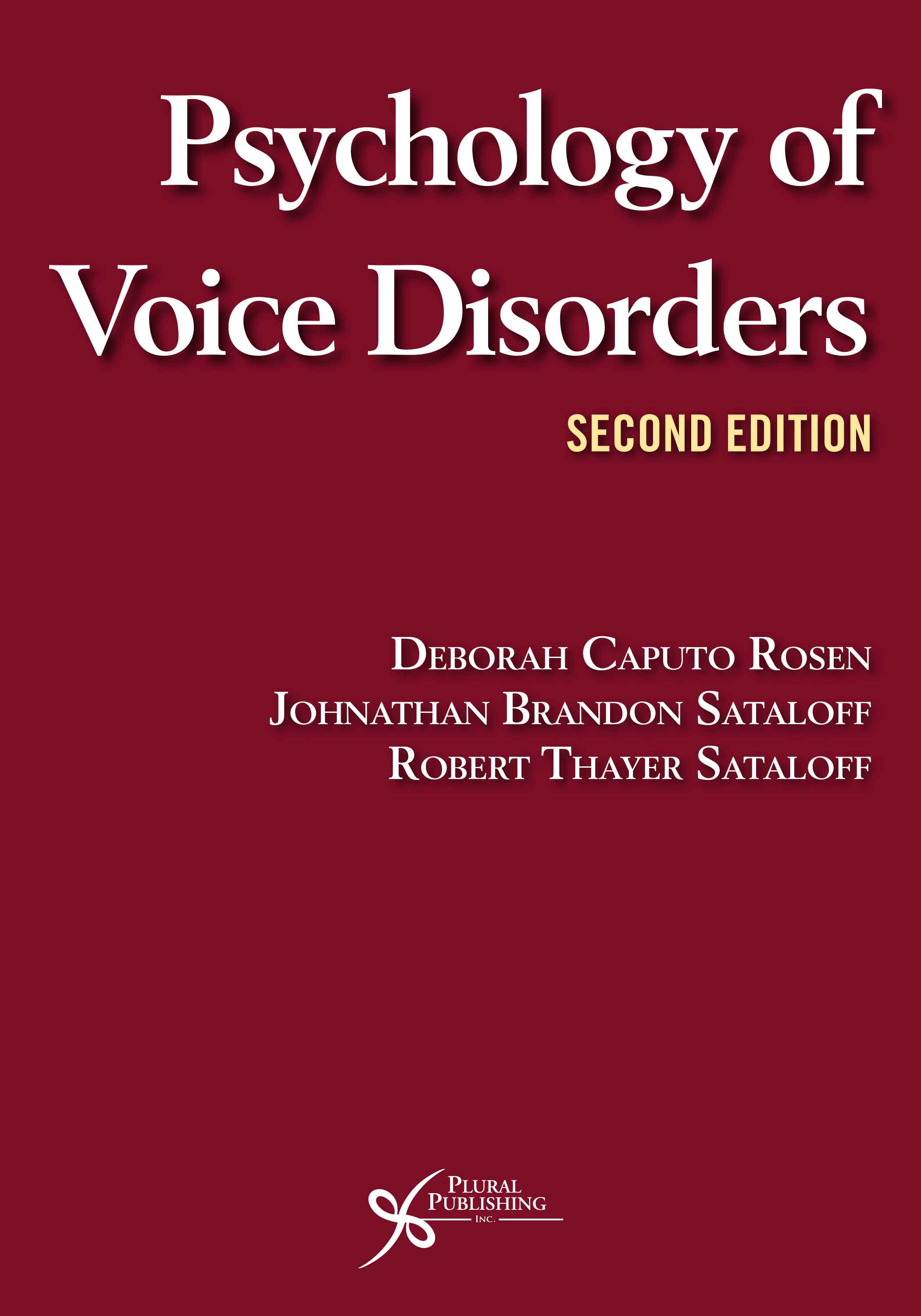
Psychology of Voice Disorders
Second Edition
Deborah Caputo Rosen, Johnathan Brandon Sataloff, Robert T. Sataloff
Details: 432 pages, Hardcover, Full Color Insert, 6" x 9"
ISBN13: 978-1-63550-235-0
© 2021 | Available
Purchase
The voice is a central part of identity, connection, and communication. As such, the psychological effects of a voice disorder, especially for individuals who use their voices professionally, can be profound and wide-reaching. The second edition of Psychology of Voice Disorders is a guide for healthcare professionals who care for patients dealing with vocal issues, including mental health professionals, speech-language pathologists, physicians, and other members of the medical team.
Psychology of Voice Disorders was the first book to offer insights into the psychology of patients with voice disorders, including the interaction between the disorder, treatment, and patient self-esteem. The revised edition builds on the features of the original to provide comprehensive support for professionals treating voice disorders.
New to the Second Edition
• New coauthor, Johnathan Brandon Sataloff, MD
• Three new chapters:
o Research Approaches in the Intersection of Voice Disorders and Psychology
o Psychiatric Manifestations of Medications Prescribed Commonly in Otolaryngology
o Trauma in Voice
• A completely rewritten chapter on psychoactive medications and their effects on the voice, providing the most comprehensive overview of the topic available
• Updated information on psychological assessment for patients with voice disorders
• Revised and expanded chapters covering common medical diagnoses, comorbid psychopathology, special considerations for voice professionals, and psychogenic dysphonia
• Added materials on current approaches to assessment and treatment
Reviews
"Indeed the preface tells us that this book is primarily aimed at psychological professionals, for whom we get the inevitable introductory chapters on the basic sciences, with some very familiar diagrams. It is 20 years since the publication of the first edition and it is indeed surprising that this remains the only book dedicated to such a commonly presented topic. The preface is particularly helpful in showing where chapters are largely unchanged or where they have been thoroughly updated and revised (the vast majority in practice). This edition adds a new chapter on research methodology hoping to inspire psychological professionals, with another new one on trauma and the voice. [...] This remains the only text covering the message of its title and it clearly has been thoroughly and commendably updated."
—Liam M. Flood, FRCS, FRCSI in Journal of Laryngology and Otology (August 2020)
"The book starts with a thorough review of voice anatomy, physiology, and all that goes into a medical voice evaluation including common medical diagnoses associated with this patient population. Throughout, the book takes the time to thoroughly describe the intersection between psychological professionals and other voice team members and how they can complement treatment of the patient. The chapter titles act as a helpful guide to readers on specific topics such as special psychological considerations for voice professionals, comorbid psychopathology, vocal fold injury, trauma in voice, voice surgery, neurological disorders affecting voice, cancer treatment, stress, and performance anxiety to name a few. The book has an excellent glossary, which can quickly guide professionals seeking more information on their topics of choice. The references are extensive and an invaluable resource to further guide curious practitioners. A highlight of the book is the excellent review of psychiatric manifestations of medications prescribed commonly by otolaryngologists for non-psychological conditions as well as psychoactive medications and their effects on the voice.
This book is an excellent resource for voice-focused clinicians, whether they be in the psychological, behavioral, or otolaryngological domains. As the authors point out, this book remains the only publication to date dedicated to this topic."
—Jonelyn Langenstein, MM, MS, CCC-SLP, BCS-S, Northwestern University Feinberg School of Medicine, in Doody's Reviews (October 2020)
“Psychology of Voice Disorders is an academic book aimed at the professional voice user or medic. Undergraduates of voice or psychology will also find this book a valuable resource. The book comprises 20 chapters of incredibly well referenced research offering a combination of overviews, case studies and explanations of areas of study and concerns of the human voice and its interactions with the human mind.
The authors are all reassuringly active in the field of psychology, voice and music.
[…] I would heartily recommend Psychology of Voice Disorders to the established singing teacher or voice coach who is seeking to develop their knowledge of the psychological demands placed on their singing students, or who wants to provide a well prepared and safe learning environment for their singers who present with mental health concerns.
Each of the 20 chapters is insightful and packed with vital detail for the voice practitioner. While the chapter headings appear academically dense and possibly overwhelming they each really provide an accessible and readable synopsis of a particular area of either; psychology and its effect on voice, voice and its effect on psychology, or the medical assessment and diagnosis process. For example, chapter 5, ‘Common Medical Diagnoses and Treatments in Patients with Voice Disorders’ is invaluable for music leaders of large group classes or wellbeing choirs. Chapters 6 and 7 provide bitesize explanations of the side effects of medication on both the voice and the mind, information which will again help the teacher to support singers who might rely on prescribed medication which limits their vocal ability. Rosen et al offer clear definitions and terminology with incredibly well referenced examples of published peer reviewed studies, assuring the reader that their work is not a philosophical soft science but is academically informed and grounded in medical fact. Further chapters cover topics of neurological illness and voice, trauma, cancer and cancer treatment, stress management, performance anxiety and art therapies, all of which add huge value to the overall relevance of the book to the contemporary voice professional.”
—Marissa Steer, in Communicating Voice (2020)
Preface
Acknowledgements
About the Authors
Contributors
Chapter 1. Introduction
Deborah Caputo Rosen, Johnathan Brandon Sataloff, and Robert Thayer Sataloff
Chapter 2. Anatomy and Physiology of the Voice
Robert Thayer Sataloff and Deborah Caputo Rosen
Chapter 3. The Medical History and Physical Examination of the Disordered Voice Patient
Robert Thayer Sataloff and Deborah Caputo Rosen
Chapter 4. Research Approaches in the Intersection of Voice Disorders and Psychology
Miriam van Mersbergen
Chapter 5. Common Medical Diagnoses and Treatments in Patients With Voice Disorders: An Introduction and Overview
Robert Thayer Sataloff, Mary J. Hawkshaw, and Johnathan B. Sataloff
Chapter 6. Psychiatric Manifestations of Medications Prescribed Commonly in Otolaryngology
Steven H. Levy, Mona M. Abaza, Mary J. Hawkshaw, Robert Thayer Sataloff, and Reinhardt J. Heuer
Chapter 7. Psychoactive Medications and Their Effects on the Voice
Johnathan Brandon Sataloff, Deborah Caputo Rosen, and Robert Thayer Sataloff
Chapter 8. Psychological Assessment of Patients with Voice Disorders
Deborah Caputo Rosen and Robert Thayer Sataloff
Chapter 9. Comorbid Psychopathology
Deborah Caputo Rosen, Johnathan Brandon Sataloff, and Stephanie Misono
Chapter 10. Voice Professionals: Special Psychological Considerations
Deborah Caputo Rosen and Robert Thayer Sataloff
Chapter 11. Psychogenic Dysphonia
Deborah Caputo Rosen, Maximillian H. Shmidheiser, Johnathan Brandon Sataloff, Jesse Hoffmeister, and Robert Thayer Sataloff
Chapter 12. Response to Vocal Injury
Deborah Caputo Rosen, Johnathan Brandon Sataloff, and Robert Thayer Sataloff
Chapter 13. Trauma in Voice
Elisa Monti
Chapter 14. Response to Voice Surgery
Deborah Caputo Rosen and Robert Thayer Sataloff
Chapter 15. Neurological Disease Affecting the Voice
Shyam K. Akula, Johnathan Brandon Sataloff, Alyssa R. Rosen, Deborah Caputo Rosen, and Robert Thayer Sataloff
Chapter 16. Cancer and Voice
Johnathan Brandon Sataloff, Deborah Caputo Rosen, and Robert Thayer Sataloff
Chapter 17. Stress Management
Deborah Caputo Rosen, Johnathan Brandon Sataloff, and Robert Thayer Sataloff
Chapter 18. Performance Anxiety
Deborah Caputo Rosen, Johnathan Brandon Sataloff, and Robert Thayer Sataloff
Chapter 19. Psychotherapeutic Management of Patients with Voice Disorders
Deborah Caputo Rosen, Johnathan Brandon Sataloff, and Robert Thayer Sataloff
Chapter 20. Perceived Voice Loss in Professional Voice Users: Principles and Case Studies with Guided Drawing Assignments
Deborah Caputo Rosen and Robert Thayer Sataloff
Appendix I. Psychological Assessment Instruments
Index

Laryngeal Manifestations of Systemic Diseases
First Edition
Abdul-Latif Hamdan, Robert T. Sataloff, Mary J. Hawkshaw
Details: 399, Full Color, Hardcover, 8.5" x 11"
ISBN13: 978-1-63550-129-2
© 2019 | Available

Professional Voice: The Science and Art of Clinical Care
Fourth Edition
Robert T. Sataloff
Details: 2224 pages, Full Color, Hardcover, 8.5" x 11"
ISBN13: 978-1-59756-709-1
© 2017 | Available
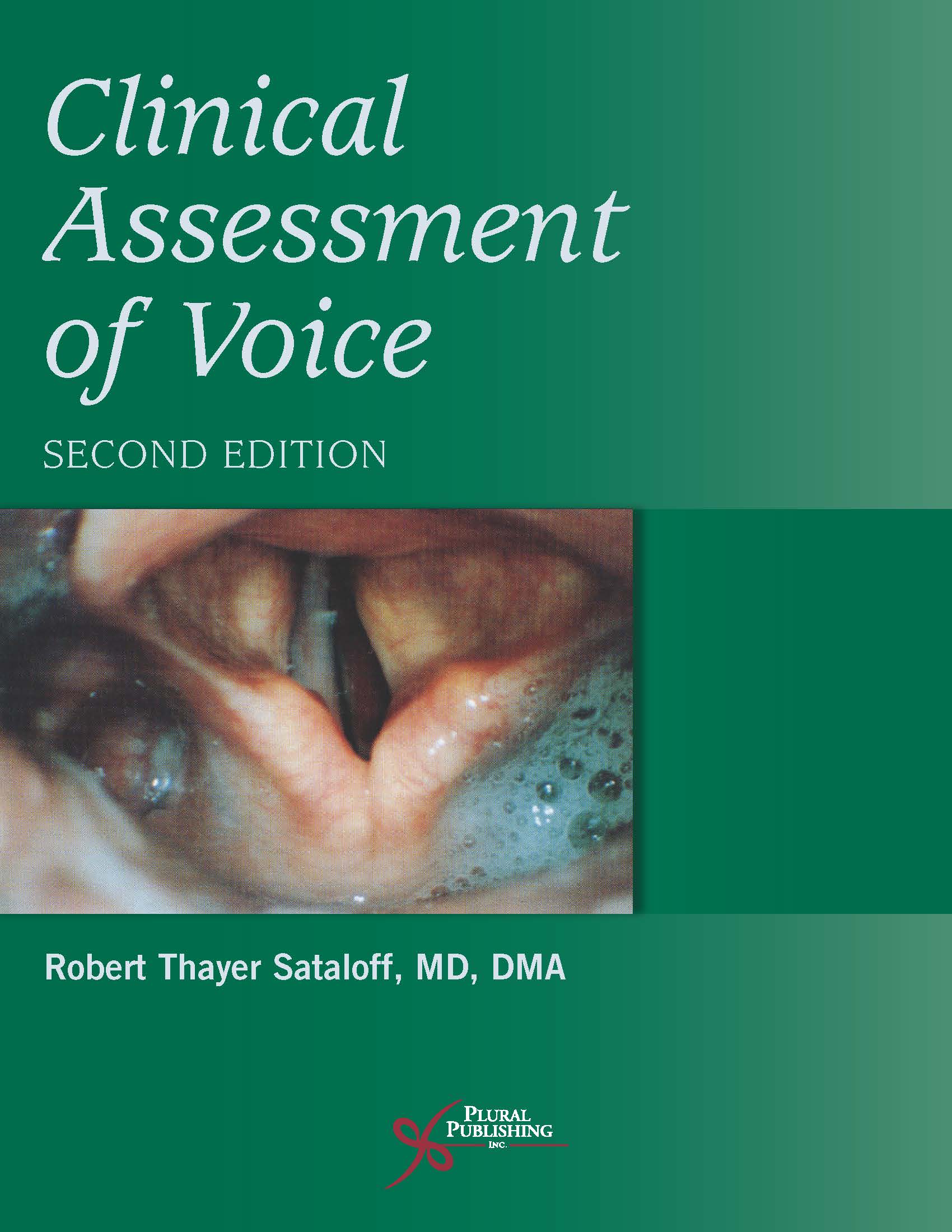
Clinical Assessment of Voice
Second Edition
Robert T. Sataloff
Details: 752 pages, Full Color, Softcover, 8.5" x 11"
ISBN13: 978-1-59756-859-3
© 2017 | Available
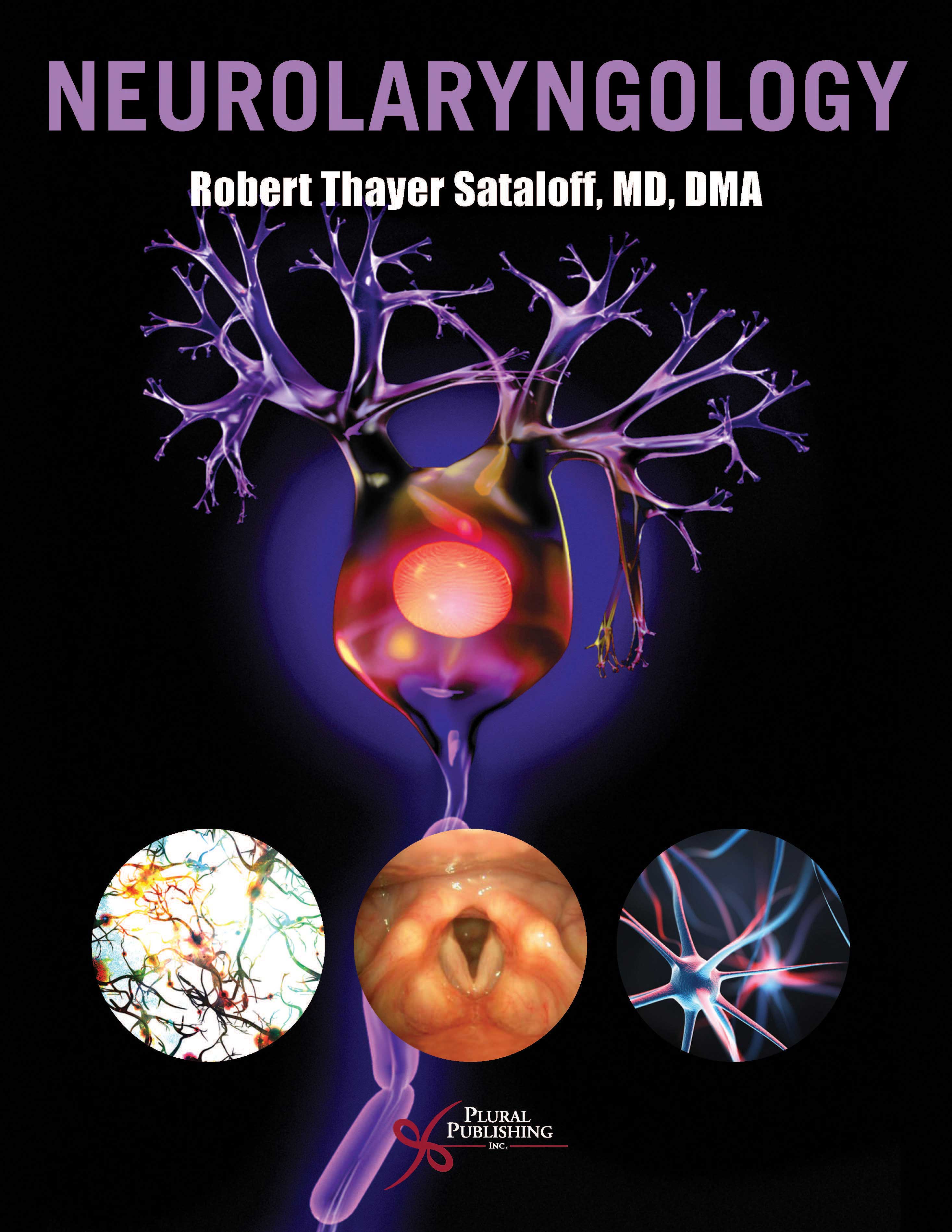
Neurolaryngology
First Edition
Robert T. Sataloff
Details: 1,161 pages, Full Color, Hardcover, 8.5" x 11"
ISBN13: 978-1-94488-383-6
© 2017 | Available
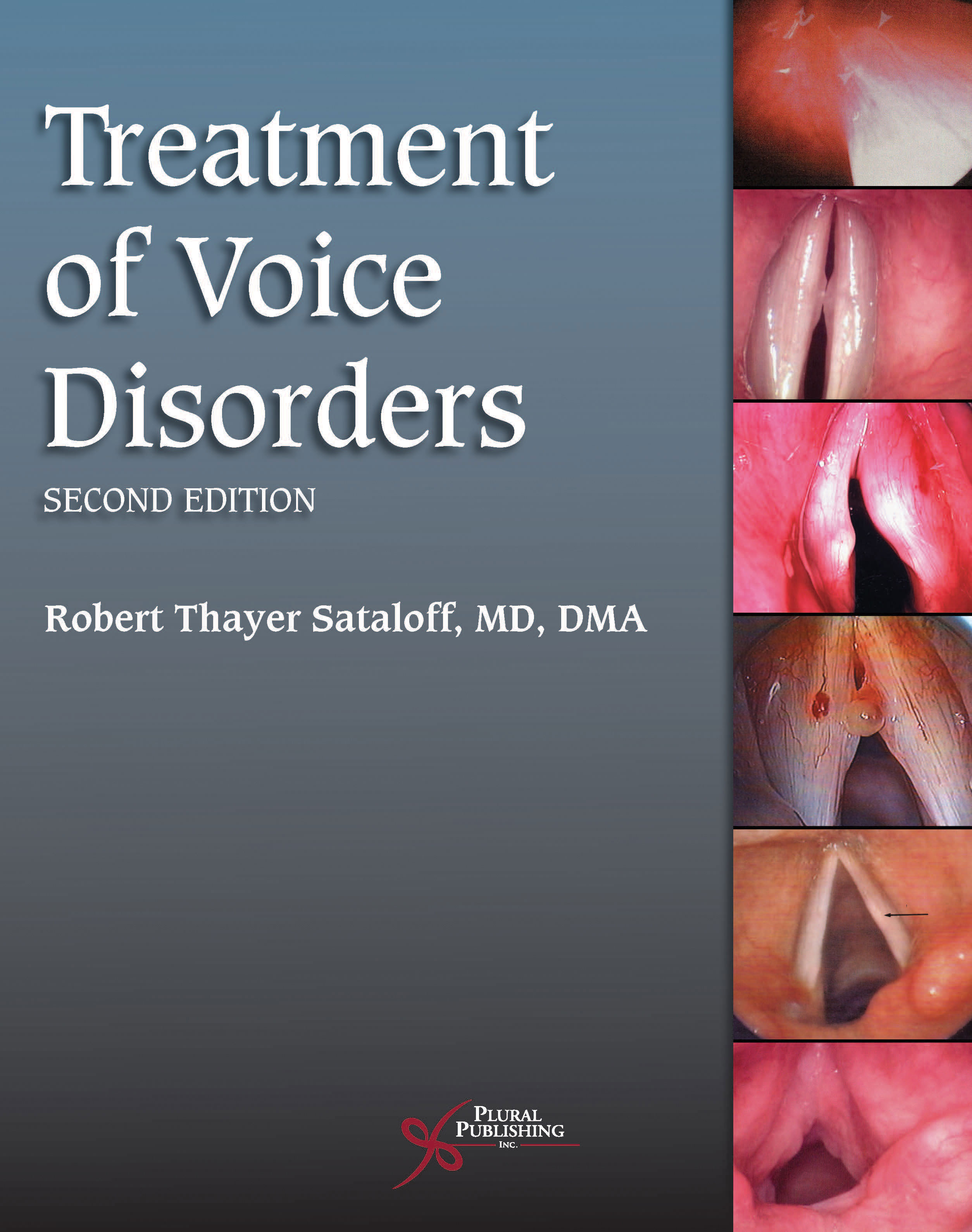
Treatment of Voice Disorders
Second Edition
Robert T. Sataloff
Details: 558 pages, Full Color, Softcover, 8.5" x 11"
ISBN13: 978-1-59756-861-6
© 2017 | Available

Diagnosis and Treatment of Voice Disorders
Fourth Edition
John Rubin, Robert T. Sataloff, Gwen S. Korovin
Details: 1019 pages, Full Color, Hardcover, 8.5" x 11"
ISBN13: 978-1-59756-553-0
© 2014 | Available

Obesity and Voice
First Edition
Abdul-Latif Hamdan, Robert T. Sataloff, Mary J. Hawkshaw
Details: 400 pages, B&W, Hardcover, 7" x 10"
ISBN13: 978-1-63550-258-9
© 2020 | Available
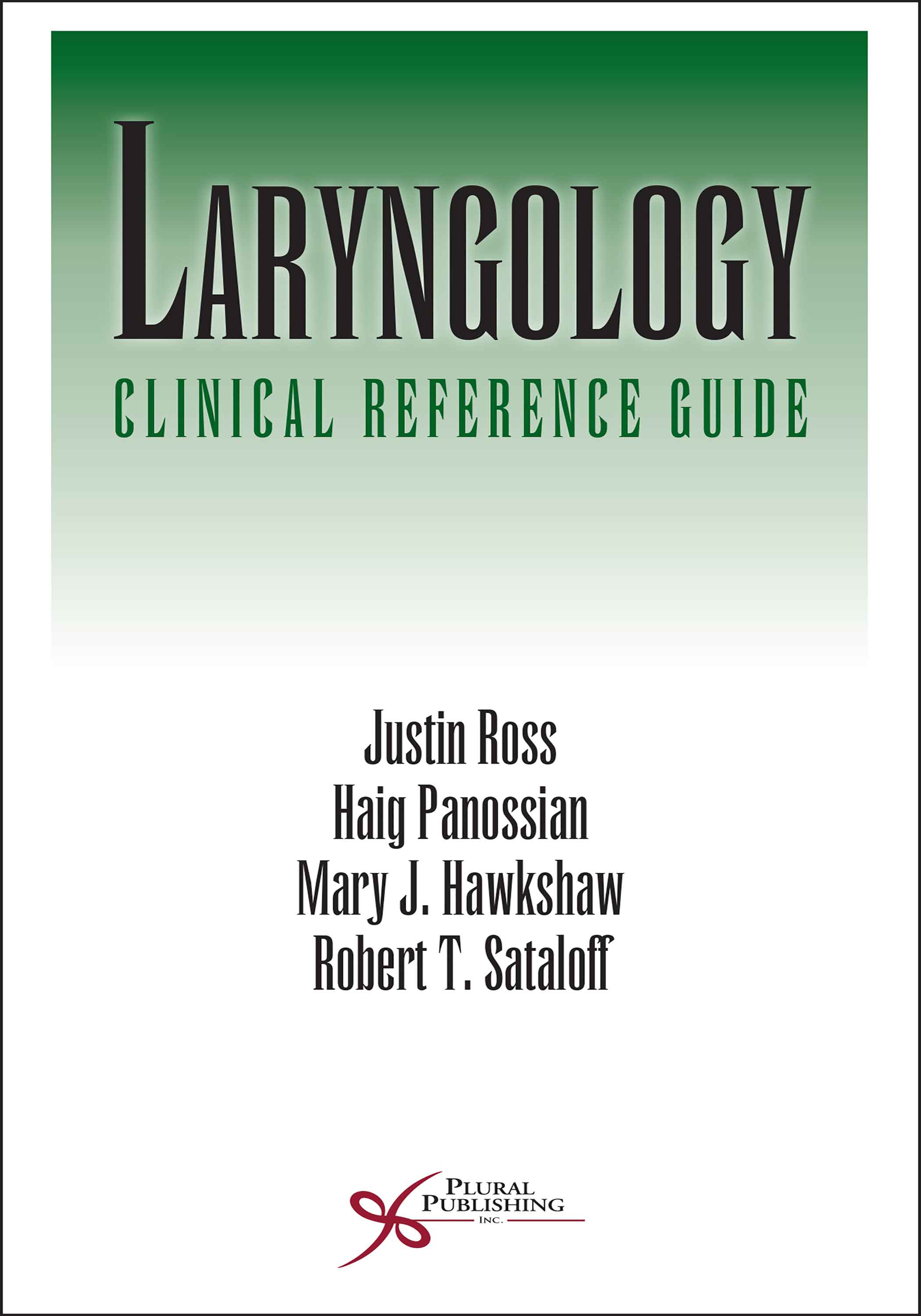
Laryngology: Clinical Reference Guide
First Edition
Justin Ross, Haig Panossian, Mary J. Hawkshaw, Robert T. Sataloff
Details: 534 pages, B&W, Softcover, 4.5" x 8"
ISBN13: 978-1-63550-140-7
© 2020 | Available

Non-Laryngeal Cancer and Voice
First Edition
Abdul-Latif Hamdan, Robert T. Sataloff, Mary J. Hawkshaw
Details: 271 pages, B&W, Hardcover, 7" x 10"
ISBN13: 978-1-63550-324-1
© 2021 | Available



